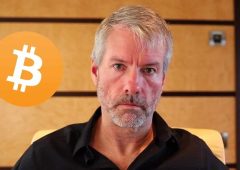Notcoin Says Tap-to-Earn Games Are Over
06.05.2025 18:00 2 min. read Alexander Stefanov
Notcoin, one of the breakout names in Web3 gaming last year, says the days of mindless "tap-to-earn" mechanics are likely over.
Speaking at Token2049 in Dubai, the team behind the viral Telegram-based game said the genre simply doesn’t keep players engaged long-term—and the industry is shifting toward more social, entertaining experiences.
The Notcoin team, led by co-founders Sasha and Vladimir Plotvinov along with product designer Uliana Salo, reflected on the explosive growth of their game, which pulled in over 30 million users in just a few months. But the momentum was short-lived. Players, driven mostly by token farming, quickly moved on to other titles once the earnings dried up.
Sasha explained that earning alone isn’t enough to retain players. What gamers want, he said, is fun—with friends, in groups, with shared goals. That’s where Telegram games, in their early form, missed the mark. Future success, according to the team, depends on putting entertainment first and treating token incentives as secondary bonuses—not the core experience.
AI is also helping speed things up. Vladimir noted that new tools have made game development faster and more efficient. But he cautioned that using AI isn’t a shortcut—it still requires technical know-how to ensure systems work under heavy user demand.
Despite the fading appeal of early Telegram games, the Notcoin team remains bullish. Salo compared Telegram’s potential to platforms like Facebook and WeChat, which host thriving game ecosystems. While Telegram lacks major publishers for now, she believes growth is inevitable—especially if games start being played for fun, not just profit.
-
1
Trump’s 2024 Crypto Earnings Top $58 Million—DeFi Stake Drives Most of the Haul
16.06.2025 9:00 2 min. read -
2
Tron Sets Sights on Wall Street Through Reverse Merger
17.06.2025 7:00 1 min. read -
3
Tether Now Among World’s Largest Holders of U.S. Treasuries, CEO Says
21.06.2025 9:00 1 min. read -
4
Big Funds Sell $51B in May, But Buybacks Cushion U.S. Stock Market
20.06.2025 10:00 2 min. read -
5
Canton Network Developer Secures $135M to Expand Institutional Blockchain Use
25.06.2025 12:00 1 min. read
Robinhood Faces Scrutiny from European Bank Over Tokenized Stock Offerings
Lithuania’s central bank has reached out to Robinhood for further details regarding its newly launched stock token products, following a public distancing by OpenAI from the initiative.
USA Imposes Tariffs on Multiple Countries: How the Crypto Market Could React
As President Trump accelerates his tariff strategy ahead of the August 1 deadline, new White House letters reveal formal trade warnings sent to multiple nations, including Tunisia, Cambodia, Indonesia, and others.
UAE Regulators Dismiss Toncoin Residency Rumors
United Arab Emirates authorities have formally denied reports linking Toncoin (TON) ownership or staking to long-term visa eligibility, calling the circulating claims inaccurate and misleading.
Binance Could Introduce Golden Visa Option for BNB Investors Inspired by TON
Changpeng Zhao, the former head of Binance, has hinted at the possibility of a new initiative that would allow BNB token holders to obtain long-term residency in the United Arab Emirates through a token-staking model.
-
1
Trump’s 2024 Crypto Earnings Top $58 Million—DeFi Stake Drives Most of the Haul
16.06.2025 9:00 2 min. read -
2
Tron Sets Sights on Wall Street Through Reverse Merger
17.06.2025 7:00 1 min. read -
3
Tether Now Among World’s Largest Holders of U.S. Treasuries, CEO Says
21.06.2025 9:00 1 min. read -
4
Big Funds Sell $51B in May, But Buybacks Cushion U.S. Stock Market
20.06.2025 10:00 2 min. read -
5
Canton Network Developer Secures $135M to Expand Institutional Blockchain Use
25.06.2025 12:00 1 min. read


